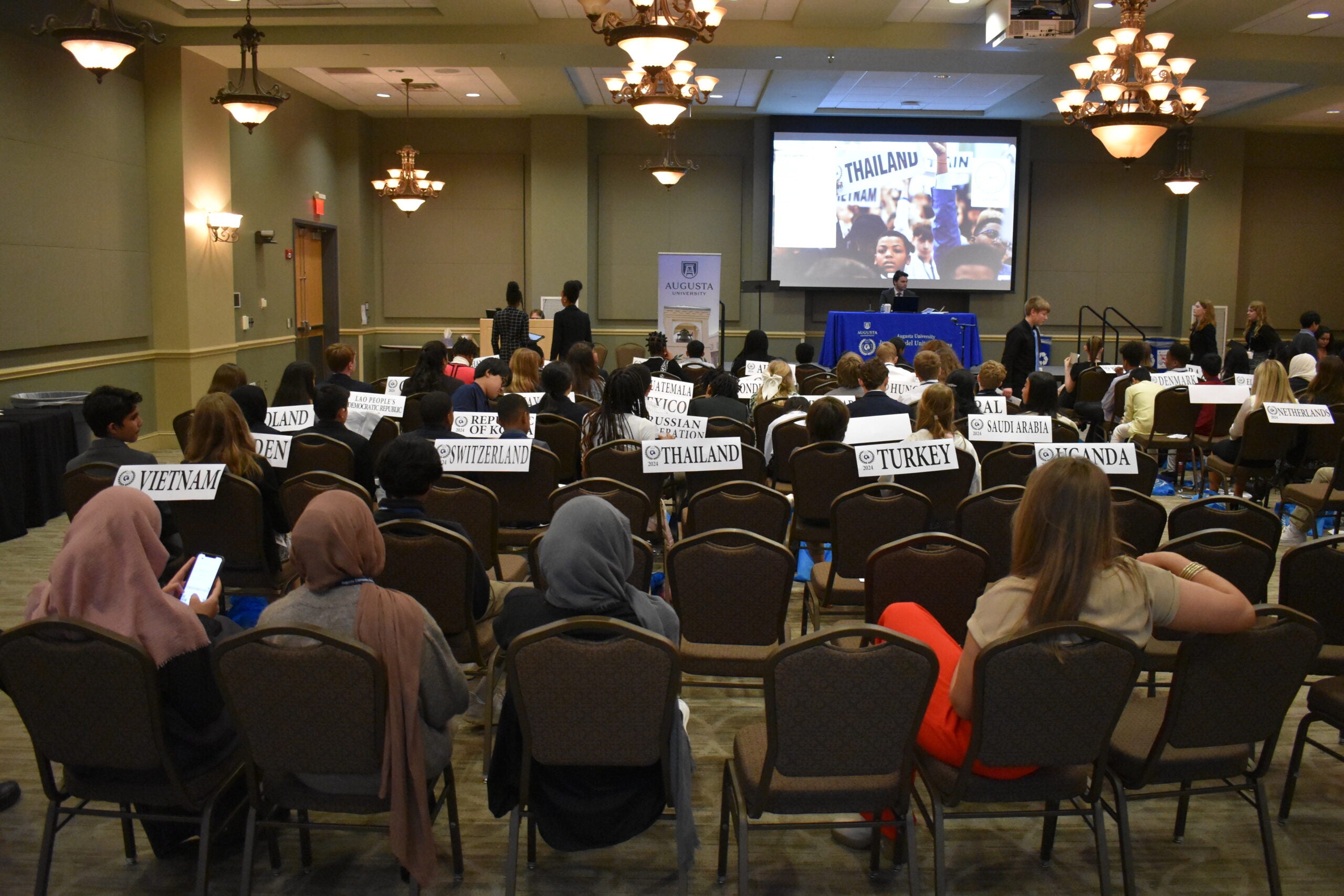Augusta University hosted approximately 150 Richmond County students from six middle schools on Tuesday, March 5, for the area’s 10th annual Junior Model United Nations (JMUN) Conference.
To debate and learn about foreign policy with other participants, students represented over 70 countries and debated issues of global concern regarding child labor laws and children’s health rights.
Participating schools included Augusta Preparatory Academy, Davidson School of Fine Arts, Ilm Academy, Riverside Middle School, Ron Clark Academy, Stallings Island Middle School and Heritage Academy.
Nadia Jilani-Hyler, Augusta University’s Model United Nations program director and JMUN organizer, said the conference presents middle schoolers with a unique opportunity to study the United Nations and learn about various countries.
“They learn so much through this … and I hope they just have fun,” she said.
By developing students’ public speaking, negotiation and presentation skills, Jilani-Hyler said she believes students leave the conference feeling more confident and self-assured in their professional capabilities.
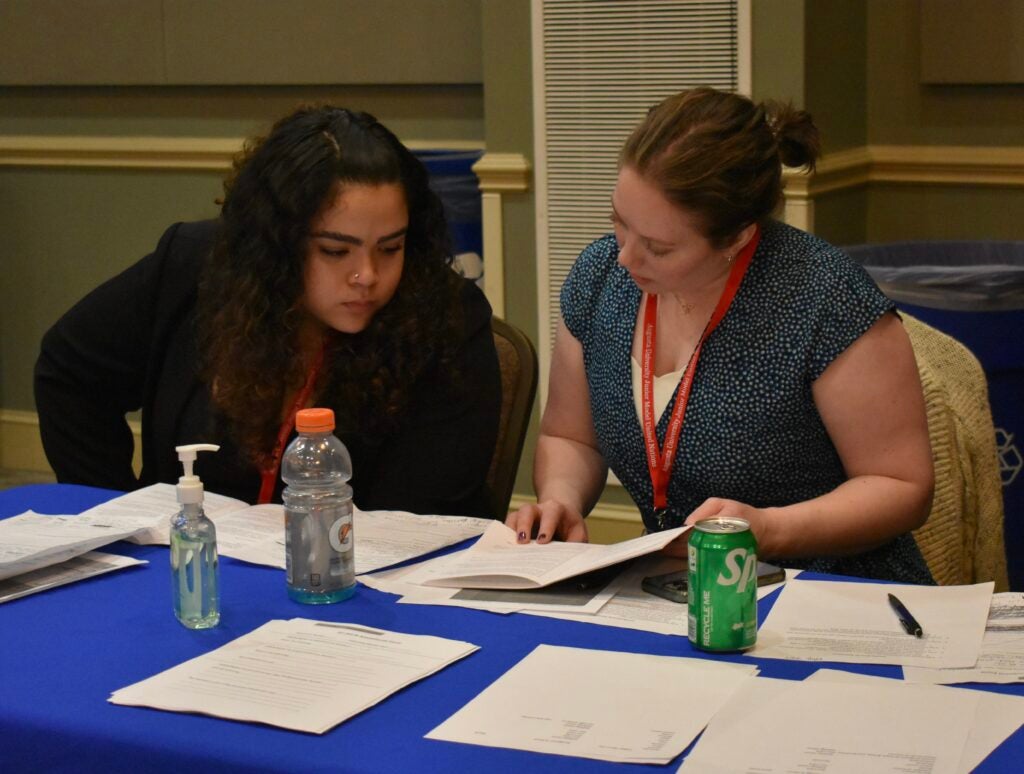
“It gives them the opportunity to learn these skills early and to practice talking with students from other schools and get out of their comfort zone, which is so important for confidence moving forward,” she said. “I think the earlier they do it, the better off they are.”
Designing the simulation around issues that will interest participants, Jilani-Hyler said students from her Model United Nations class had a heavy hand in preparing and running the simulation to give middle schoolers a positive experience.
MORE: Parks and Recreation director dodged bullet with resignation
“It’s a whole day affair, and they work on draft resolutions that our students, from Augusta University, prepared for them,” she said. “They have the opportunity to amend these draft resolutions that’s supposed to solve a global problem.”
According to Jilani-Hyler, after amending drafts, students vote on whether or not to pass resolutions and thus learn about the significance voting can have within governments and organizations.
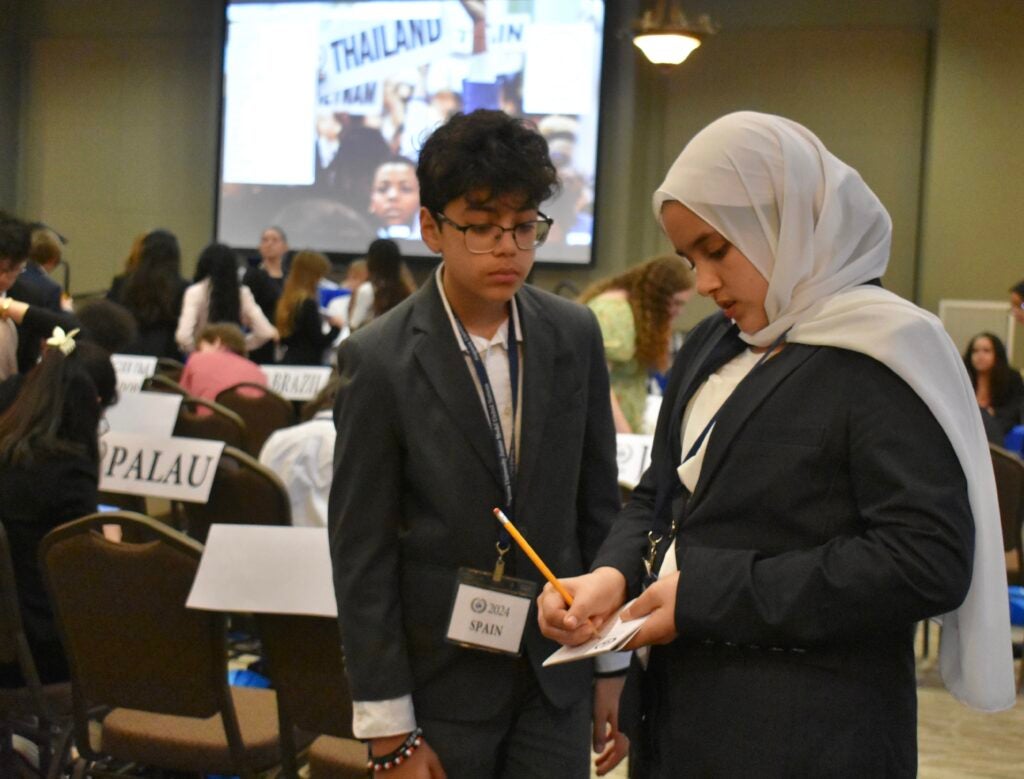
“It gives students the opportunity to think about the United States’ government and what U.S. foreign policy might be on a particular issue,” she said. “Child labor laws within the U.S. are pretty good at protecting children compared to other countries in the world, so it gives them some perspective.”
Although some students might have a negative opinion about some regions of the U.S., Jilani-Hyler said learning about major issues in other countries can teach attendees to appreciate the U.S. and the rights and freedoms the government guarantees citizens.
“Children are fairly healthy in the United States and pretty protected from child labor, so then they can learn about what it’s like in the rest of the world and kind of compare where they live,” she said. “The voting opportunity also gives them a chance to have some advocacy for themselves too.”
Chip Kirksey, an Augusta Preparatory seventh and eighth grade history teacher, said he started his school’s Model United Nations program five years ago, because he believes it teaches students many useful skills.
“It’s part of our global perspective program at Prep, where we really want the kids to be exposed to other cultures, other religions and other countries,” he said. “[Model UN] is just another way for us to accomplish that mission.”
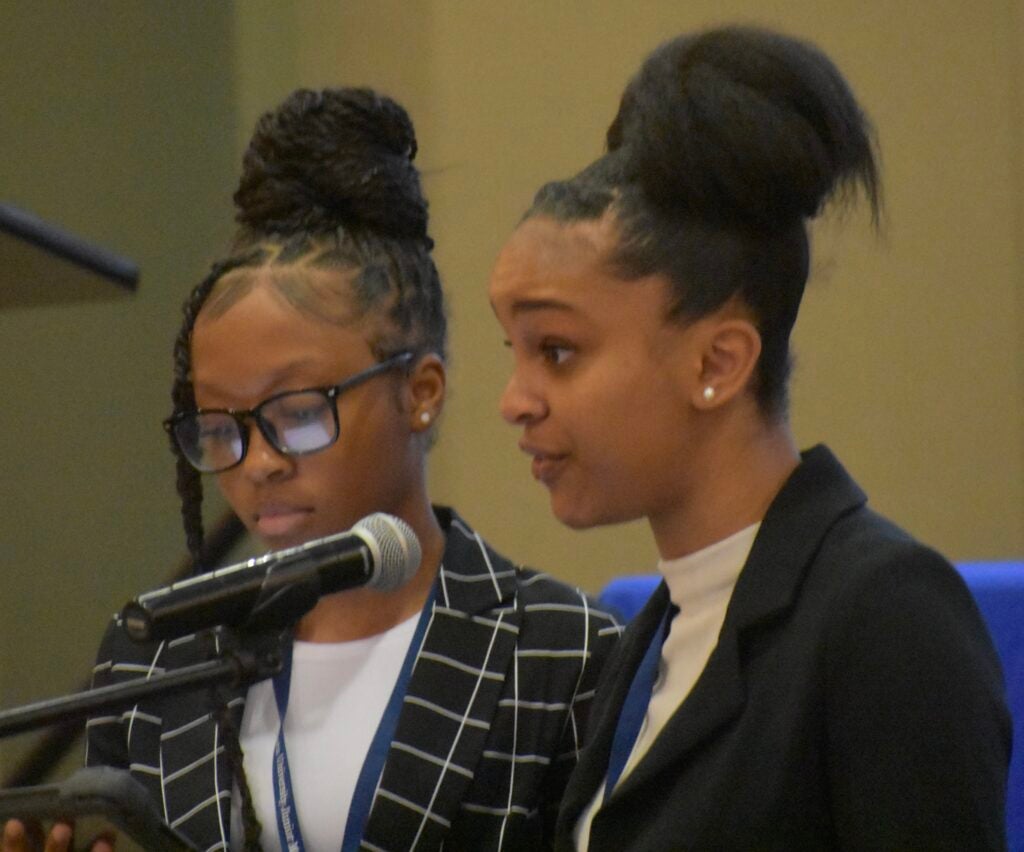
By educating students in worldly knowledge, Kirksey said he hopes each will graduate as “well-rounded” and “diverse” individuals.
Kirksey especially became interested in AU’s JMON Conference because it gives Augusta Prep students an immersive, realistic learning experience outside the classroom.
“I think one of the most interesting things about them actually going through the conference is that they understand how change happens slowly,” Kirksey said.
With students growing up in a “point-and-click world” that delivers immediate results, Kirksey said it is important to remind children that not everything can occur instantaneously.
“As young people, they are frustrated when things don’t happen quickly,” he said. “So I think [JMUN] is a great process for them to go through to realize that real change takes time and it takes patience. They can see that from sitting in the conference.”
For participating eighth grade student Ayanna Khiani, who attends Augusta Prep, JMUN was a memorable experience because it allowed her to make new community connections with students from other schools.
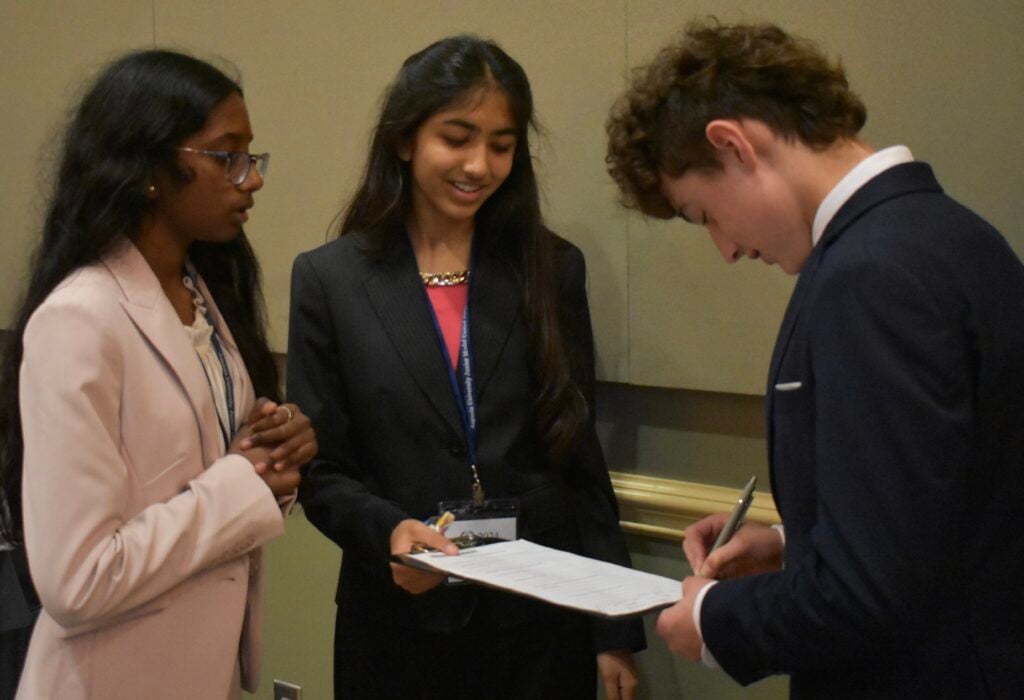
“I’ve learned that the United Nations are really cool, and the people here are really nice,” she said. “If you collaborate really closely with someone, you can make friends. I’ve just had so much fun.”
From collecting signatures to exchanging notes and eventually passing amendments, Khiani said she learned a lot from representing El Salvador and conversing with others.
“El Salvador is a country that still has child labor because it’s really hard to completely get rid of it, but countries that still have it are really working hard to get rid of it,” she said.
Narek Heboyan, a second year participant and fellow eighth grade Prep student, said representing Venezuela and researching other countries’ practices have helped him realize the importance of politics and collaboration.
“I think it’s important that people our age learn what’s going on in the world because, as we grow, it’s going to become more and more important to know these things in order to be a more well rounded person to engage in these conversations,” Heboyan said. “It improves the character of someone.”
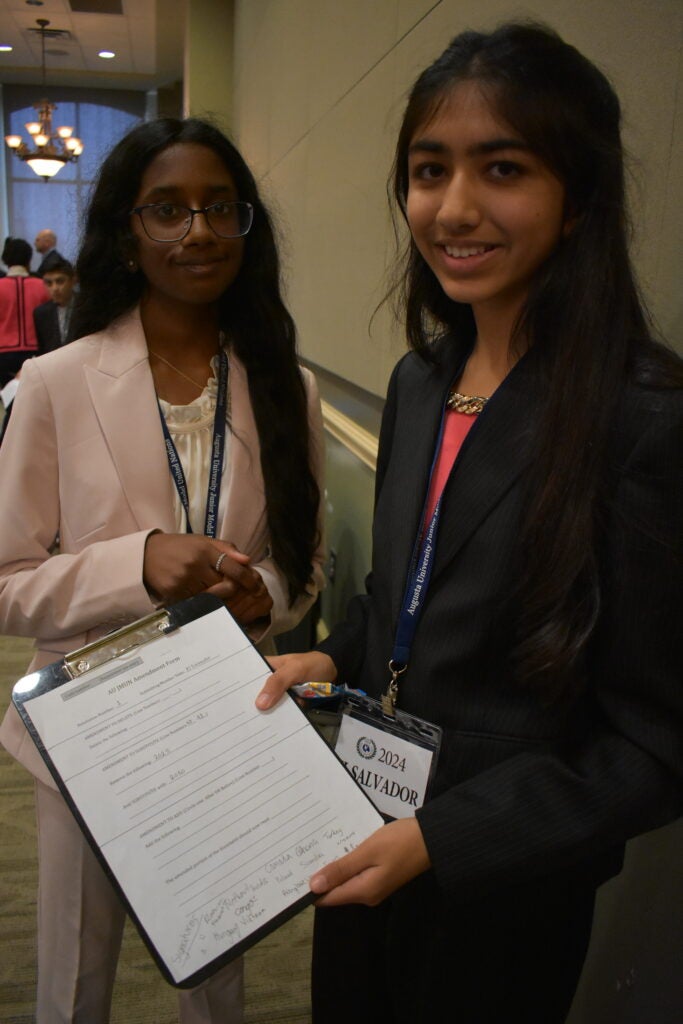
Heboyan also said educating oneself on the stark differences of how other countries operate can allow a person to further appreciate the U.S.
“In the U.S., we’re very lucky to have the opportunities that we have and the rights that we have,” he said. “We don’t have to worry about providing for our families or what we’re going to eat tonight. It’s just not a problem in America that people typically have, but in a lot of other countries that’s an important question.”
From organizing and leading simulations for middle schoolers, Jilani-Hyler said she hopes her collegiate students gain inspiration and motivation to succeed in their annual conference, which will take place towards the end of March in New York City.
“I hope they learn that if a middle schooler can do it, then they can do it too,” she said.

